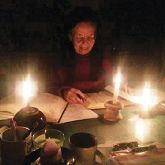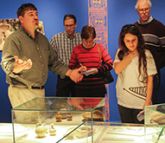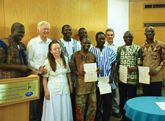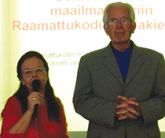×


We have detected your country as:
Please click here to go to the USA website or select another country from the dropdown list.
by: Janet Aslin, Assistant Editor
 Twenty years ago Dr. Halvor Ronning and his wife Mirja co-founded the “Home for Bible Translators and Scholars in Jerusalem” (HBT). It was birthed in 1994 when they were both teaching at the Institute of Holy Land Studies (Jerusalem).
Twenty years ago Dr. Halvor Ronning and his wife Mirja co-founded the “Home for Bible Translators and Scholars in Jerusalem” (HBT). It was birthed in 1994 when they were both teaching at the Institute of Holy Land Studies (Jerusalem).
Mirja reached out to two struggling Ugandans, recognizing the importance for them to have a “home” where all their needs would be taken care of so they would be able to devote themselves fully to the rigorous study of Bible translation. The Ronnings provided that home and the Ugandans were able to successfully complete the year-long course.
The following year, HBT began in earnest. The “flagship of academic studies through HBT” is their semester-long program which is offered in conjunction with Hebrew University (HU).
“Text in Context” was the slogan Dr. Ronning used as he began to answer my question, “What makes a good translator?” There are actually two contexts: the original text language and the receptor, or language into which a text is being translated. In order to achieve the most accurate translation, one must consider the culture, geography, history, politics and more for both contexts. For a Bible translator, first-hand knowledge of the Land of Israel and becoming immersed in the language of the Bible are key factors in achieving accurate results. Where else but Israel is one surrounded by people speaking the language in which the Tanakh (Gen.–Mal.) was written?
 Initially students were not required to take Modern Hebrew, but at the urging of their academic partners at HU, the Ronnings decided to investigate the matter. They compared the first 1,000 words taught in a Hebrew ulpan (institute or school for the intensive study of Hebrew) with those found in the Tanakh and discovered that an astonishing 88% of the words were found in both places! Now HBT students take the semester-long “Hebrew as a Living
Initially students were not required to take Modern Hebrew, but at the urging of their academic partners at HU, the Ronnings decided to investigate the matter. They compared the first 1,000 words taught in a Hebrew ulpan (institute or school for the intensive study of Hebrew) with those found in the Tanakh and discovered that an astonishing 88% of the words were found in both places! Now HBT students take the semester-long “Hebrew as a Living  Language” course with other college students. This addition has been invaluable as former student, Rachelle Wenger, testifies:
Language” course with other college students. This addition has been invaluable as former student, Rachelle Wenger, testifies:
It was Modern Hebrew that got me ‘over the hump’ in Biblical Hebrew and turned it from foreign, laboriously-read code into a living language. The thing Israel offers which cannot be duplicated in any other country is the opportunity to hear and speak the language all day long—and that is the key to mastery.
It’s not just listening to and speaking Hebrew that gives a home-town advantage to these Bible translators. They are living in the Land where the events of the Bible took place. Throughout the course, professor and students travel to relevant biblical sites for enhanced understanding of the context in which biblical events happened.
 After twenty years’ time, the Ronnings are seeing the fruit of their labors. Their students have come from 25 countries, speaking 75 different languages. Today students arrive who have been taught their pre-requisites by HBT-graduates. Testimonies of the impact of having Scriptures in their mother tongue have come from previous students. In one instance, thirty years ago in a pagan tribe there were six believers. Now, after the Bible has become available in their language, 60% of the tribe has become Christian.
After twenty years’ time, the Ronnings are seeing the fruit of their labors. Their students have come from 25 countries, speaking 75 different languages. Today students arrive who have been taught their pre-requisites by HBT-graduates. Testimonies of the impact of having Scriptures in their mother tongue have come from previous students. In one instance, thirty years ago in a pagan tribe there were six believers. Now, after the Bible has become available in their language, 60% of the tribe has become Christian.
 As our talk was ending, I asked Dr. Ronning what the next twenty years will look like. The short answer: there is a definite need for the work that HBT is doing. There are shortages of translators, translation consultants and Hebrew teachers. There are many people groups who do not have the Bible in their mother tongue. He made two requests: 1) help spread the word to translators about the Home for Bible Translators and Scholars in Jerusalem and 2) pray. For more information, visit their website at www.bibletranslators.org
As our talk was ending, I asked Dr. Ronning what the next twenty years will look like. The short answer: there is a definite need for the work that HBT is doing. There are shortages of translators, translation consultants and Hebrew teachers. There are many people groups who do not have the Bible in their mother tongue. He made two requests: 1) help spread the word to translators about the Home for Bible Translators and Scholars in Jerusalem and 2) pray. For more information, visit their website at www.bibletranslators.org
Photo Credit: Home-for-Bible-Translators-and-Scholars-in-Jerusalem/www.facebook.com
All logos and trademarks in this site are property of their respective owner. All other materials are property of Bridges for Peace. Copyright © 2024.
Website Site Design by J-Town Internet Services Ltd. - Based in Jerusalem and Serving the World.